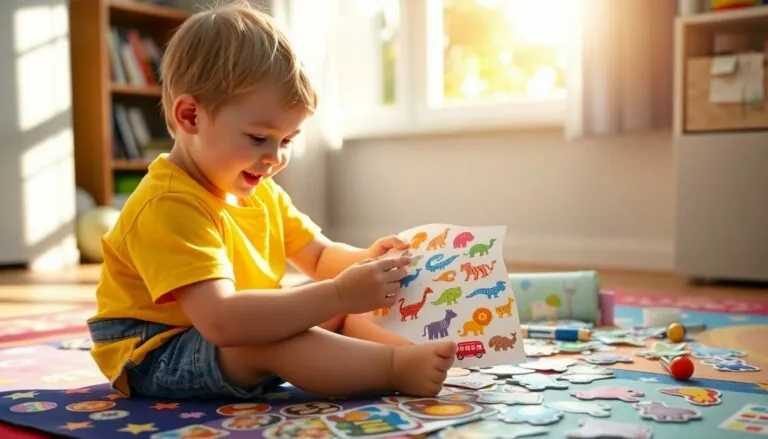Table of Contents
ToggleImagine a classroom where kids aren’t just sitting at desks, but exploring the world around them like tiny adventurers. Welcome to Montessori elementary schools, where learning feels less like a chore and more like an exciting quest. Here, children discover their passions through hands-on experiences, fostering creativity and independence in ways traditional schools often overlook.
Overview of Montessori Education
Montessori education revolves around an innovative approach that fosters independent learning. Children engage in activities that nurture their natural curiosity, allowing them to develop critical thinking skills.
Principles of Montessori Method
Montessori education emphasizes several key principles. First, respect for each child drives personalized learning. Second, the prepared environment enhances exploration and discovery. Third, mixed-age classrooms promote peer learning and social development. Fourth, hands-on materials provide concrete experiences that aid understanding. Lastly, self-directed activities encourage independence and responsibility. Together, these principles create a nurturing atmosphere where children thrive academically and socially.
History of Montessori Schools
Montessori schools originated in the early 1900s, developed by Dr. Maria Montessori in Italy. Dr. Montessori’s work with underprivileged children inspired her educational philosophy. By 1910, the first Montessori school opened in the United States, marking a significant milestone. Over the decades, Montessori education expanded globally, adapting to different cultures and needs. Today, thousands of Montessori schools operate worldwide, maintaining core principles while tailoring their programs to local contexts.
Montessori Elementary School Curriculum
Montessori elementary schools emphasize a holistic curriculum that fosters exploration and curiosity. This curriculum integrates various subjects, allowing students to connect knowledge from different disciplines.
Core Subjects
Core subjects in Montessori elementary schools include language arts, mathematics, science, and social studies. Language arts focus on reading, writing, and communication skills through engaging activities. Mathematics encourages problem-solving and critical thinking with tactile materials, like beads and number rods. Science lessons involve hands-on experiments, promoting inquiry-based learning about the natural world. Social studies introduce students to geography, history, and cultural awareness through collaborative projects and real-world experiences.
Individualized Learning Plans
Montessori elementary education implements individualized learning plans tailored to each child’s unique interests and abilities. Teachers observe and assess students to create personalized goals, fostering greater engagement. This approach enables children to progress at their own pace and develop self-discipline. Each learner chooses activities that resonate with them, enhancing motivation and ownership of their education. Collaboration between students encourages peer learning and builds community within the classroom.
Benefits of Montessori Elementary Schools
Montessori elementary schools provide numerous benefits that enhance children’s educational experiences. Two key advantages are the development of critical thinking and social and emotional growth.
Development of Critical Thinking
Montessori education emphasizes exploration and discovery. Children engage in hands-on activities that stimulate their analytical skills. Self-directed learning encourages students to ask questions and seek solutions independently. For example, they might conduct experiments in science to understand concepts rather than memorizing facts. Such interactions foster deep comprehension and a love for learning. This approach enhances abstract thinking, preparing students for complex problem-solving in the future. Moreover, students learn to appreciate diverse perspectives, contributing to more profound critical insight.
Social and Emotional Growth
Montessori environments promote collaborative learning, significantly impacting social skills. Mixed-age classrooms allow children to engage with peers of varying developmental stages. Younger students learn from older ones while older students reinforce their knowledge by teaching. Such interactions cultivate empathy and teamwork. Furthermore, the focus on respect and responsibility nurtures emotional intelligence. Students make choices about their activities, building confidence and self-regulation abilities. As they navigate group dynamics and conflicts, they develop resilience and strong communication skills. These experiences prepare children for successful relationships in and out of the classroom.
Challenges Faced by Montessori Elementary Schools
Montessori elementary schools encounter various challenges that can impact their effectiveness. Understanding these challenges helps in navigating the complexities of this educational approach.
Misconceptions About Montessori Education
Many misconceptions surround Montessori education, creating confusion among parents and educators. Some believe it lacks structure, yet children benefit from a carefully prepared environment that promotes self-direction. Others argue Montessori methods do not cover essential subjects, while the curriculum integrates topics like language arts and mathematics. Furthermore, some perceive Montessori as overly casual, overlooking the discipline and responsibility children develop through choice and exploration. Addressing these myths is crucial for clearer insights into Montessori practices.
Integration with Traditional Education Systems
Integrating Montessori methods within traditional education systems presents significant hurdles. Educational standards and standardized testing often clash with Montessori’s individualized approach to learning. Teachers trained in traditional methods sometimes find it challenging to adapt, leading to potential misunderstandings about student expectations. Additionally, parents accustomed to conventional schooling may question the effectiveness of Montessori teaching styles. Collaborating with traditional schools to bridge these gaps requires open communication and mutual understanding of each system’s strengths and weaknesses.
Finding the Right Montessori Elementary School
Finding the right Montessori elementary school requires thorough research and consideration of various factors. Parents should first look for an environment that aligns well with the Montessori philosophy.
Key Factors to Consider
Curriculum emphasis plays a critical role in a Montessori education. Look for schools that offer hands-on learning experiences across subjects. The structure of the classroom enhances social interaction; mixed-age groups encourage peer learning. Teacher qualifications also significantly impact the educational experience; trained staff create a supportive atmosphere. Additionally, consider school size; smaller classes often allow for more individualized attention. Finally, observe school culture, as a nurturing environment fosters students’ growth.
School Accreditation and Quality
Accreditation ensures that a Montessori school meets specific educational standards. Look for accreditation from recognized bodies such as the American Montessori Society or the Association Montessori Internationale. Schools with this recognition often guarantee quality education rooted in the Montessori method. Researching school reviews and parent testimonials provides insights into school performance and satisfaction. Regular assessments also indicate how well a school adheres to Montessori principles. Ultimately, ensuring quality through accreditation and feedback helps families make informed decisions.
Conclusion
Montessori elementary schools offer a transformative educational experience that prioritizes exploration and independence. This unique approach not only nurtures children’s natural curiosity but also equips them with essential skills for lifelong learning. By fostering critical thinking and social-emotional growth in a supportive environment, these schools prepare students for future challenges.
As parents consider educational options, understanding the principles and benefits of Montessori education can guide them toward making informed decisions. With a focus on personalized learning and community, Montessori schools stand out as an effective choice for fostering well-rounded, confident individuals ready to thrive in an ever-changing world.







